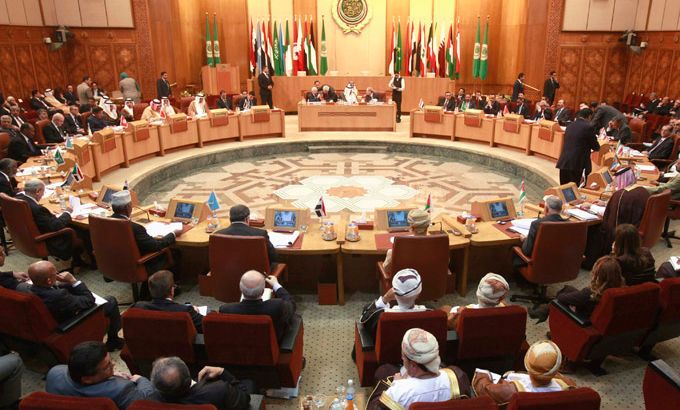Arab League decides to suspend Syria
Syrian ambassador denounces move as illegal after regional bloc demands “total implementation” of Arab plan.

The Arab League has given Syria three days to end its violent crackdown on protesters demanding President Bashar al-Assad’s resignation or face suspension from the regional body.
In a statement read in Cairo on Saturday by Sheikh Hamad bin Jassim Al Thani, the Qatari prime minister, the league said it would “suspend Syrian delegations’ activities in Arab League meetings” and implement “economic and political sanctions against the Syrian government”.
The Arab League also called on its member states to withdraw their ambassadors from Damascus and threatened to recognise the Syrian National Council (SNC), a broad-based opposition group, if Syria does not implement an Arab peace deal that it previously agreed to.
Sheikh Hamad said that the suspension would take effect on November 16; and that 19 member countries voted in favour of the measure, while Lebanon and Yemen objected and Iraq abstained.
The decision, which came after a meeting of Arab ministers, does not amount to a full suspension of membership from the regional body.
Al Jazeera’s Jane Arraf, reporting from Cairo, explained: “The Arab League could have imposed immediate sanctions or suspended Syria outright, but surprisingly did not do that but wanted to send a very strong message to Syria.”
Sheikh Hamad said: “We were criticised for taking a long time but this was out of our concern for Syria. We needed to have a majority to approve those decisions.
“We are calling all Syrian opposition parties to a meeting at the Arab League headquarters to agree a unified vision for the transitional period.”
‘Historic day’
Wael Merza, SNC secretary-general, told Al Jazeera that the outcome of Saturday’s Arab League meeting marked “a historic day for Syria as a country, the Syrian revolution and the Arab League where the Arab people as a whole heard the voices of the Syrian people who have been calling for such measures” in the past months.
“They have been calling for freedom and they wanted the Arab League to be the first to acknowledge their calls and that is what is happening today,” he said.
Merza also said that the Arab League’s decision was not likely to ease tensions on the ground.
“Unfortunately, knowing the nature of the regime, we know the violence will be even more harsh in the coming few days,” he said.
“But this move isolates the regime to a great extent – economically, diplomatically and politically.”
‘Scandalous declaration’
Meanwhile, Syria denounced the Arab League’s decision as “illegal and a violation of the organisation’s charter”.
Youssef Ahmad, Syria’s ambassador to the Arab League, told Syrian state television the decision “is an announcement of the death for joint Arab action, and a scandalous declaration that the leadership of such action is subject to American-western agendas”.
Ahmad also said that Syria had already implemented the Arab League’s peace plan, but was threatened with suspension anyway.
Under an Arab League plan agreed on November 2, Syria pledged to pull the military out of flashpoint cities, free political prisoners and start talks with the opposition.
However, since then, security forces have killed more than 100 people in the central city of Homs, the New York-based Human Rights Watch said in a report issued on Friday.
According to the UN, the Syrian government’s crackdown on anti-government protesters has left more than 3,500 people dead since public dissent against President Assad’s rule erupted in mid-March.
International support for decision
Barack Obama, the US president, welcomed the move from the Arab League.
“These significant steps expose the increasing diplomatic isolation of a regime that has systematically violated human rights and repressed peaceful protests,” Obama said in a statement issued in Hawaii, where he is hosting an Asia-Pacific summit.
Hillary Clinton, the US secretary of state, said the league’s decision was a “strong and historic stance”.
“The failure of the Assad regime, once again, to heed the call of regional states and the international community underscores the fact that it has lost all credibility,” Clinton added.
The European Union, meanwhile, said that its members “fully support the Arab League’s move.
“We welcome the Arab League’s offer to end the violence and bring about the reforms that the Syrian people have bravely demanded over the last few months,” said Michael Mann, spokesman for EU foreign policy chief Catherine Ashton.
William Hague, the British foreign minister, said the decision showed the “frustration” of the Arab League’s membership over Assad’s “intransigence”.
“As Syrian security forces escalate the violence on the streets of Syria, we and others across the international community share this frustration,” Hague said.
France, which has sought firm condemnation of the Syrian government at the United Nations Security Council for months, urged the international community to act quickly to “make the violence end, protect the civilian population and allow for political transition in Syria”, Alain Juppe, the French foreign minister, said.
In Damascus, meanwhile, crowds armed with sticks and knives attacked the Saudi embassy after the Arab League’s decision was announced.
“Protesters contesting the Arab League decision against Syria broke the glass of the embassy by throwing stones and destroyed furniture inside the embassy complex,” the Saudi Arabian state news agency reported, without elaborating.
The French and Turkish consulates in Latakia were also attacked, residents said.